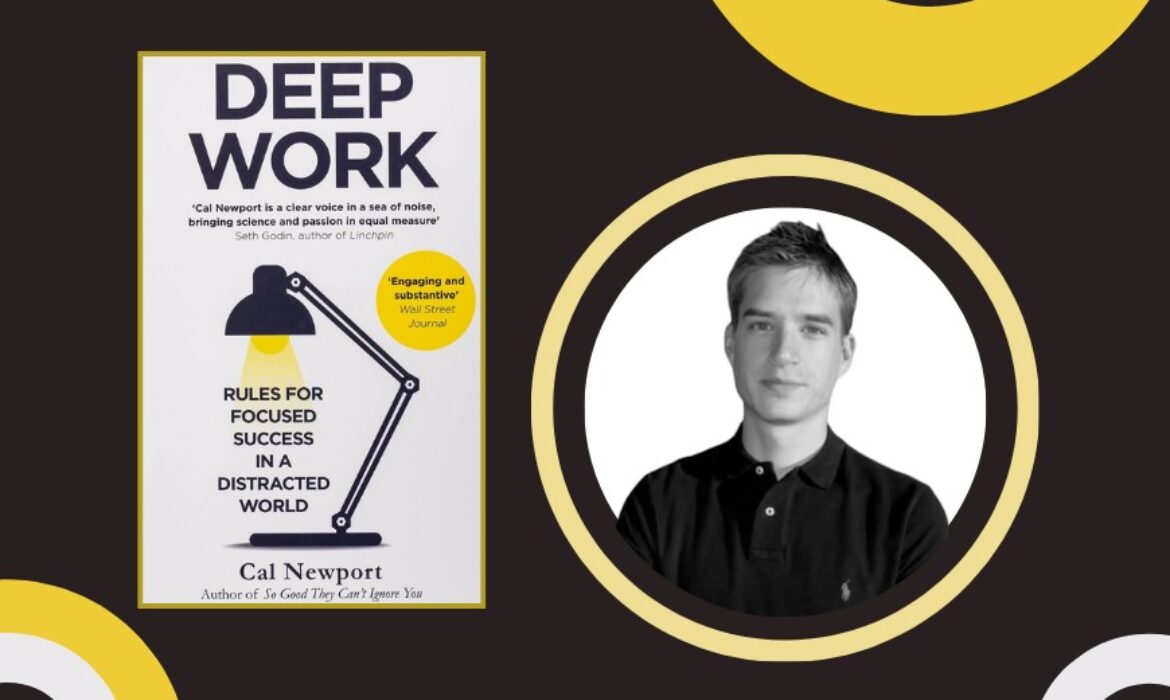
The Book in Three Sentences:
- Deep work is the ability to focus without distraction on a cognitively demanding task.
- Shallow work refers to tasks that are easy to perform and often done while distracted.
- Mastering deep work is essential to achieving extraordinary results in an increasingly competitive world.
The Five Big Ideas:
- The Importance of Deep Work: Deep work is critical for enhancing skills, creating valuable output, and achieving high levels of productivity.
- The State of Deep Work: To enter a state of deep work, one must eliminate distractions and focus intensely on the task at hand.
- Rules for Deep Work: Newport provides actionable rules to cultivate deep work, including scheduling deep work sessions and embracing boredom.
- The Benefits of Deep Work: Engaging in deep work leads to significant advancements in personal and professional goals.
- Overcoming Distractions: Strategies such as limiting social media and creating a deep work environment help maintain focus and productivity.
Deep Work Summary:
- The Importance of Deep Work:
- Key Idea: Deep work is essential in today’s knowledge economy, where the ability to produce high-quality work is highly valued.
- Practice: Regularly engage in deep work to enhance your skills and output.
- Quote: “Deep work is the superpower of the 21st century.”
- The State of Deep Work:
- Key Idea: Entering a state of deep work requires eliminating distractions and dedicating focused time to cognitively demanding tasks.
- Practice: Create rituals and routines that support deep work, such as specific work hours and a distraction-free workspace.
- Quote: “Your work output is a function of two factors: the amount of time you spend on the work and the intensity of your focus during this time.”
- Rules for Deep Work:
- Key Idea: Newport provides several rules to cultivate deep work, including working deeply, embracing boredom, quitting social media, and draining the shallows.
- Practice: Schedule dedicated deep work sessions, minimize shallow work, and avoid distractions.
- Quote: “Clarity about what matters provides clarity about what does not.”
- The Benefits of Deep Work:
- Key Idea: Engaging in deep work leads to significant advancements in your personal and professional goals, resulting in more meaningful and high-quality output.
- Practice: Prioritize deep work in your daily schedule to achieve your long-term goals.
- Quote: “The ability to perform deep work is becoming increasingly rare at exactly the same time it is becoming increasingly valuable in our economy.”
- Overcoming Distractions:
- Key Idea: Distractions hinder deep work and productivity. Strategies such as limiting social media use and creating a conducive work environment help maintain focus.
- Practice: Implement practices like the “30-Day Challenge” to evaluate and reduce the use of distracting technologies.
- Quote: “The key to developing a deep work habit is to move beyond good intentions and add routines and rituals to your working life designed to minimize the amount of your limited willpower necessary to transition into and maintain a state of unbroken concentration.”
Examples from the Book:
- Carl Jung: Newport shares the example of Carl Jung, who built a tower in the woods to engage in deep work and produce groundbreaking psychological theories.
- Bill Gates: Gates used “Think Weeks” to retreat into seclusion and engage in deep thinking, leading to major advancements at Microsoft.
Who Should Read It:
“Deep Work” is ideal for anyone looking to improve their productivity, focus, and ability to achieve significant results in their personal and professional lives. It is particularly beneficial for knowledge workers, students, and anyone in creative fields.
How the Book Changed Me:
Reading “Deep Work” helped me recognize the value of focused, distraction-free work periods and inspired me to implement strategies for deep work in my daily routine. It has improved my productivity, skill development, and overall quality of work.
For more detailed insights, you can explore Cal Newport’s Deep Work website.
